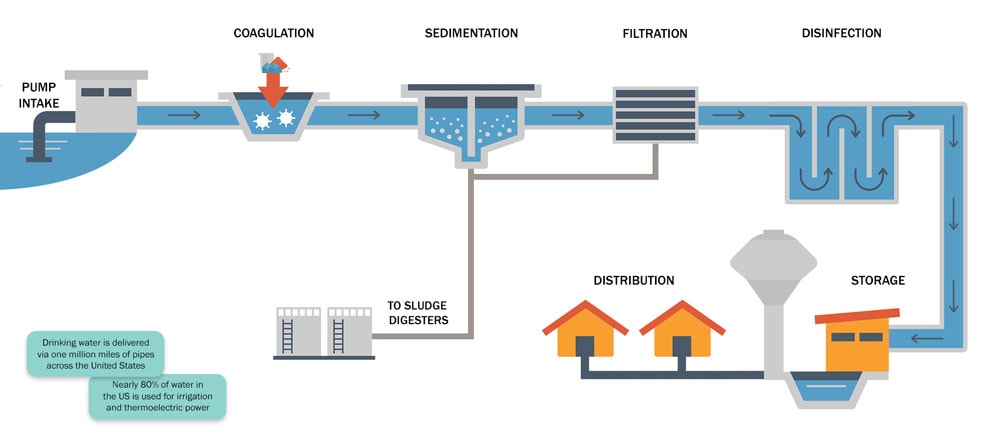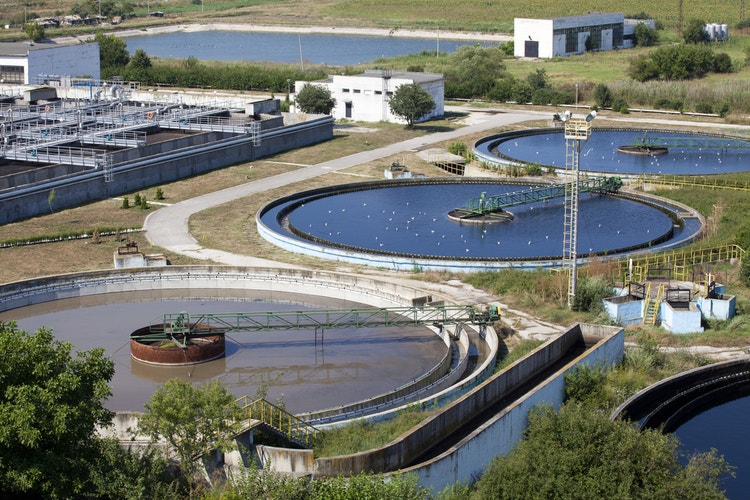Understanding Policy Barriers for Water Technology Startups
Wiki Article
Discovering Water Technology Startups: Just How They Revolutionize Sustainable Solutions
Water Technology startups are becoming essential players in the quest for sustainable remedies to international water concerns. These business leverage cutting-edge technologies to boost water efficiency and management. Their contributions attend to pressing obstacles such as shortage and contamination. In spite of their potential, they encounter various challenges that could influence their success. Comprehending these characteristics drops light on the future of water sustainability and the role these startups may play in shaping it.The Value of Water Technology in Today's World
As international water scarcity magnifies, the importance of water Technology becomes increasingly evident. Water Technology plays a vital duty in attending to the obstacles positioned by boosting and diminishing freshwater resources demand. It encompasses a broad variety of developments, consisting of innovative filtering systems, wastewater treatment modern technologies, and smart watering solutions. These improvements not just enhance the performance of water use however additionally promote sustainable techniques throughout numerous sectors, including agriculture, sector, and metropolitan growth.Additionally, the significance of water Technology expands beyond source administration. It fosters durability versus climate adjustment influences, such as floods and droughts, by supplying flexible solutions for water preservation and monitoring. Furthermore, it supports public health and wellness by making sure accessibility to tidy and risk-free drinking water. As the world faces growing water-related difficulties, the combination of advanced water modern technologies is vital for promoting sustainable advancement and safeguarding water availability for future generations.
Cutting-edge Solutions From Water Technology Startups
While traditional approaches to water monitoring have offered their function, a new wave of water tech startups is reinventing the sector with ingenious options (Water Technology Startups). These firms take advantage of innovative modern technologies to resolve pushing water problems, such as scarcity, contamination, and ineffective circulation. Lots of start-ups utilize expert system and artificial intelligence to enhance water use and anticipate demand, resulting in even more lasting practicesFurthermore, numerous companies focus on creating innovative filtration systems that get rid of contaminants and make water secure for intake. Others discover decentralized water treatment modern technologies, enabling areas to handle their water resources better. Some startups are pioneering smart watering options that reduce water waste in agriculture, advertising environmental preservation.
Case Studies: Effective Water Technology Startups
Many water Technology start-ups have actually arised as leaders in resolving worldwide water challenges through innovative approaches. One remarkable instance is Xylem, which concentrates on water analytics and clever infrastructure to optimize water usage and minimize waste. Their solutions have been carried out in numerous towns, showing substantial improvements in water management performance.One more successful start-up, Absolutely no Mass Water, has actually developed solar-powered hydropanels that draw out water vapor from the air, providing lasting alcohol consumption water in dry regions. Water Technology Startups. This Technology has actually been released in a number of countries, making certain areas have accessibility to clean water
AquaVenture Holdings operates a diverse profile of water-as-a-service remedies, dealing with water shortage with desalination and wastewater therapy. Their jobs have proven important in areas dealing with severe water lacks, showcasing the capacity of innovative water innovations to develop lasting, favorable influences. These instance researches highlight the transformative potential of startups in the water Technology field.
The Role of Smart Technology in Water Monitoring
Smart Technology plays a vital function in modern water monitoring by leveraging IoT applications to enhance source usage. Data analytics enhances effectiveness by providing workable insights, while remote monitoring options allow real-time oversight of water supply. Together, these innovations change exactly how water is managed, promoting sustainability and operational effectiveness.IoT Applications in Water
As water shortage and management obstacles magnify internationally, the combination of Web of Things (IoT) applications has actually emerged as a critical remedy in optimizing water resources. IoT Technology promotes real-time surveillance and evaluation of water systems, making it possible for a lot more effective use and administration. Sensing units released in numerous water frameworks can track quality, circulation rates, and leakage, offering valuable data to stakeholders. This information encourages consumers and utilities to make educated choices, minimizing waste and enhancing preservation efforts. Furthermore, smart watering systems utilize IoT to optimize water distribution for farming, guaranteeing that plants get the correct amount of water at the correct time. On the whole, IoT applications are changing conventional water administration techniques, cultivating sustainability and strength in water resource systems.Data Analytics for Efficiency
Harnessing information analytics is crucial for improving performance in water administration. Water Technology start-ups are significantly utilizing advanced analytics to optimize this website source appropriation and reduce waste. By examining information from various resources, these start-ups can determine patterns and fads that notify far better decision-making. Anticipating analytics can anticipate water demand, enabling energies to change supply as necessary, thus reducing scarcities and surpluses. Furthermore, real-time data handling allows the prompt discovery of leakages and inadequacies within distribution systems, substantially decreasing operational expenses. Data-driven understandings encourage stakeholders to carry out targeted preservation approaches, promoting lasting practices. Essentially, incorporating information analytics right into water monitoring not just improves operations yet also promotes lasting sustainability in water source usage.Remote Tracking Solutions
While standard water administration systems usually battle with inadequacies, remote surveillance options are changing exactly how water resources are handled. These cutting-edge modern technologies make it possible for real-time information collection and evaluation, permitting stakeholders to keep an eye on water top quality, flow prices, and use patterns from afar. Using sensors and IoT tools, remote tracking gives immediate understandings that assist in positive decision-making. This change not only enhances operational performance however likewise promotes sustainability by minimizing water waste and enhancing source allotment. Furthermore, remote surveillance systems can recognize prospective concerns before they escalate, thereby decreasing the risk of contamination or facilities failure. As water Technology startups continue to develop these remedies, the market is poised for significant improvements in sustainable water management techniques.Obstacles Facing Water Technology Startups
Water Technology start-ups run into significant challenges that can impede their development and success. Trick issues consist of securing sufficient funding, steering via complex governing environments, and completing in a crowded market. These obstacles require strategic preparation and development to conquer.Funding and Financial Investment Hurdles
Development in water Technology holds tremendous capacity for attending to worldwide obstacles, start-ups in this market usually face considerable funding and financial investment obstacles. Numerous financiers stay cautious, regarding the water industry as high-risk as a result of its intricate governing landscape and lengthy advancement timelines. Additionally, start-ups commonly battle to demonstrate prompt productivity, which can discourage prospective backers. Conventional equity capital may ignore water technology, preferring markets More Help with quicker returns, such as technology or consumer goods. Securing grants and government funding can be affordable and time-consuming, further complicating financial stability. As an outcome, many ingenious water Technology startups find themselves in a ragged edge, needing imaginative funding strategies to navigate these monetary barriers and accomplish their goalsRegulative Conformity Issues
Steering governing compliance is a significant challenge for startups in the water Technology industry, as they should grapple with a myriad of local, nationwide, and international regulations. These laws frequently incorporate water top quality standards, environmental management laws, and security procedures, which can vary widely across territories. Startups may find it hard to navigate this complex landscape, especially when scaling operations or going into brand-new markets. The expenses connected with conformity can be substantial, diverting resources away from innovation and product development. In addition, hold-ups in acquiring necessary authorizations or certifications can impede growth and market entry. A robust understanding of regulative frameworks is vital for these startups to ensure sustainable operations and stay clear of prospective lawful repercussions.Market Competition Characteristics
As water Technology startups arise in an affordable landscape, they encounter countless challenges that can hamper their development and innovation. Established business typically dominate the marketplace, leveraging resources and experience to maintain their positions. Startups have problem with minimal funding, which limits study and development capabilities, making it difficult to contend on Technology and pricing. Furthermore, the quickly developing nature of water innovations needs continuous adjustment, further straining startup resources. Governing difficulties can make complex market entry, as conformity with environmental standards is crucial yet pricey. Drawing in skilled ability in a niche area offers an additional barrier, as bigger companies may supply more enticing employment plans. As a result, these factors produce a complicated setting for water Technology startups intending to be successful.
The Future of Water Technology and Sustainability

The future of water Technology will likely concentrate on integrating expert system and data analytics to enhance water circulation and use patterns. By utilizing real-time information, business can predict scarcities and manage sources much more successfully. Sustainable methods will certainly become a foundation of the industry, urging circular economic climates where water is recycled and dealt with. Eventually, the continued evolution of water Technology will certainly be crucial in producing resistant infrastructures capable of fulfilling the difficulties positioned by environment change and populace growth while advertising environmental stewardship.
Often Asked Inquiries
What Are the Key Metrics for Evaluating Water Technology Startups?
Secret metrics for examining water Technology start-ups include market potential, scalability, customer procurement prices, income growth, modern technology advancement, governing conformity, environmental try this website impact, affordable benefit, and team proficiency, all critical for establishing long-term feasibility and success.Exactly How Can Individuals Assistance Water Technology Innovations?
Individuals can support water Technology advancements by buying start-ups, supporting for plan modifications, joining community campaigns, sharing understanding about sustainable methods, and advertising understanding of water concerns with social networks and local events.What Are Usual Funding Resources for Water Tech Startups?
Usual funding resources for water technology startups include financial backing, government grants, crowdfunding systems, angel capitalists, and corporate partnerships. These economic methods aid promote advancement and growth in lasting water management technologies.
Which Industries Benefit Most From Water Technology Advancements?
Industries such as farming, power, manufacturing, and local solutions benefit considerably from water Technology advancements. These technologies boost water effectiveness, reduce prices, and advertise sustainable practices, ultimately adding to ecological conservation and source administration.Are There Any Kind Of Governing Difficulties Details to Water Modern Technology?
Yes, water Technology deals with regulatory obstacles, including conformity with environmental standards, allowing processes, and differing regional laws. These intricacies can hinder technology and slow down the execution of new modern technologies in the water administration sector.Water Technology start-ups are arising as important players in the pursuit for sustainable options to international water issues. As worldwide water deficiency increases, the relevance of water Technology ends up being significantly apparent. Others check out decentralized water therapy technologies, enabling neighborhoods to handle their water sources more effectively. One more effective start-up, No Mass Water, has developed solar-powered hydropanels that remove water vapor from the air, providing sustainable alcohol consumption water in dry regions. Their projects have actually proven important in regions dealing with severe water lacks, showcasing the capacity of innovative water technologies to develop lasting, positive effects.
Report this wiki page